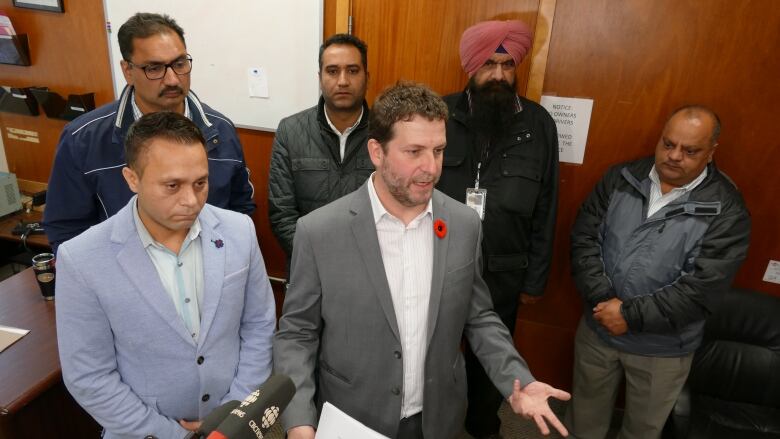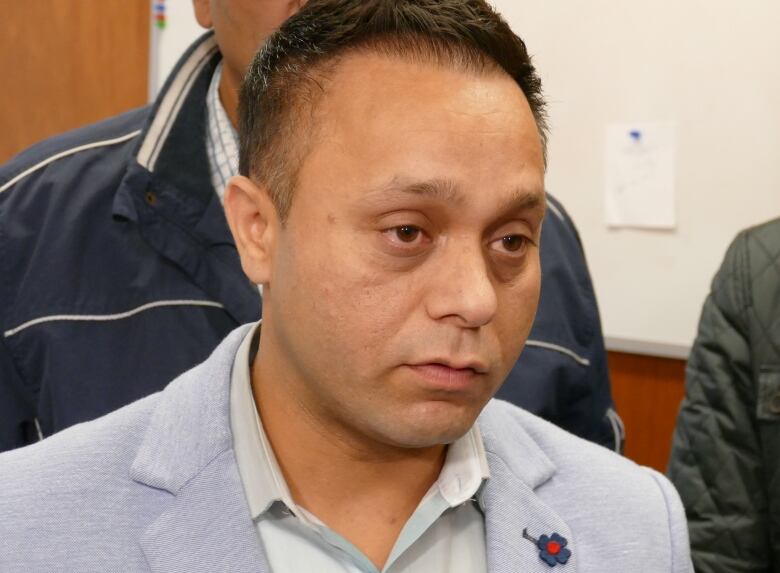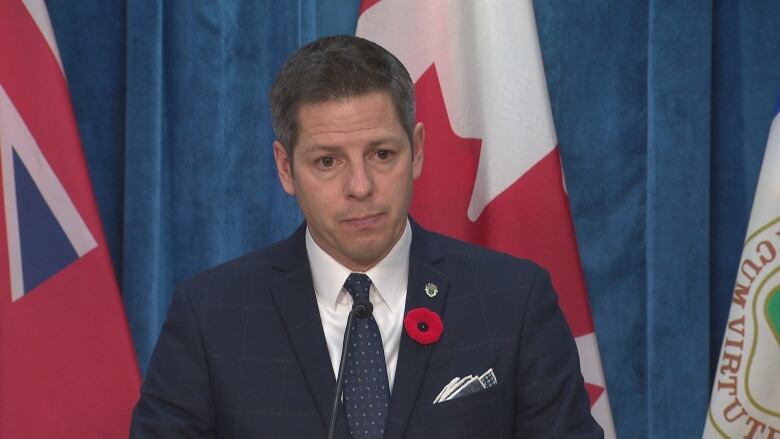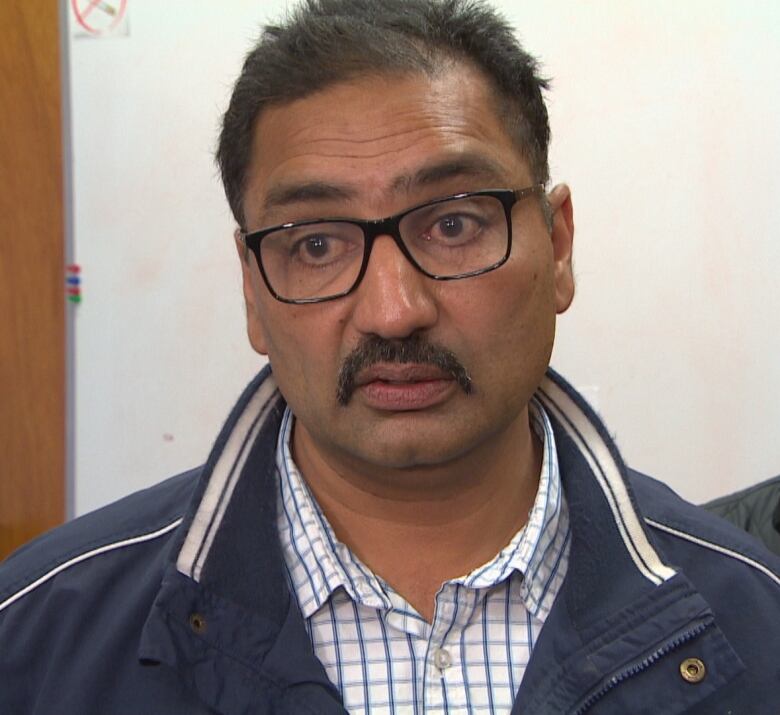Cabbies argue Uber drivers need shields if ride-hailing service comes to Winnipeg
Coalition argues Uber should be subject to safety measures introduced after 2001 stabbing death of driver

Uber drivers shouldbe required to install safety shields in their vehicles if the city decides to let the ride-hailing company into the Manitoba market, Winnipeg cabbies say.
The WinnipegCommunity Taxi Coalitionlaunched a set of proposed regulationsit's calling "PritamDeol'sLaw" on Wednesday. The organization held up the 2001 stabbing death of Unicity Taxi driver Pritam Deolas an argumentfor why Uber drivers should be subject to the same safety standards as local cab companiesto help ensure no more drivers are killed on the job.
"We all know that taxi driving is one of the most dangerous jobs in the world," Winnipeg Community Taxi Coalition spokesperson ScottMcFadyensaid.
Deol, 52,was found stabbed multiple times in the early morning of July 18, 2001. Three people were arrested and charged in the case.
Deol's death ushered in arequirement in 2011 that all Winnipeg cab drivershave protective plastic shieldsinstalled around the driver's seat to prevent such crimes. Panic buttons, camerasand criminal and child-abuse record checks for drivers are also now mandatory, McFadyen said.
"It's a great legacy formy dad there hasn't been any [more] taxi-related deaths," in Winnipeg since, said Gurpreet Deol, one of the slain driver's four children.
Deol, who has helped work on the implementation of previous safety measures, saysone of the main things that inspired him to get involved wasthe chance to reduce violenceand preventdeaths in cabs.

"I think the system has accomplished that," he said.
"The cameras, the shields, the criminal-background checks, those are very important elements of keeping our drivers safe on the road. And without mentioning any specific industry, I think this needs to apply as a standard across the industry."
McFadyensays PritamDeol'sLawis focused on maintaining the safety measures brought in after the cabbie's murder in the eventUberrides into town.
"There's been a massive reduction in violence against taxi drivers and we're just asking forWinnipeggers' support," he said.
Rejecting'ride-sharing'
McFadyentakes issue with the description of Uber and similar models as"ride-sharing" services.
"If it walks like a taxi, if it talks like a taxi, it's a taxi," McFadyen said. "I would say we're a better service than Uber on many levels."
We haven'thad any indications from the city with how they're going to proceed with this.- ScottMcFadyen, Winnipeg Community Taxi Coalition spokesperson
McFadyen invoked standards set out in theLocal Vehicles for Hire Actthat apply to cabs, limousines and similar services, and criticized the provincial legislation for not going far enough to ensure ride-hailingvehicles will be safe for drivers and passengers alike.
Another point of contention with the legislation, McFadyen says, is that the bill gives municipalities the power to craft their own bylaws for the looming localUber industry.
"We haven'thad any indications from the city with how they're going to proceed with this," he said. "This is an industry that impacts 1,600 full-time drivers, and to not have these conversations with us is upsetting to say the least."
'The sooner the better'
Winnipeg Mayor Brian Bowman says he and some city councillors have been lobbied "very, very hard" by the taxicab industry and ride-hailing industries.
He says the proposed installation of shields in ride-hailing vehicles is something that will have to be hammered out in the coming months.

"I do think there's an opportunity to improve the customer service for Winnipeggers who are riding in taxicabs or in ride-sharing," Bowman said. "Safety is a big issue for me, and safety is a big issue for Winnipeggers."
The act sets out a timeline that would allow for ride-sharing in Manitoba as early as March 1, 2018. Bowman says that based on that legislation, the city has a responsibility to have aregulatory process in place in Winnipeg by then.
"The sooner that we can have an administrative report for debate and for input by industry stakeholders and obviously members of councilthe sooner the better," he said.
"The longer we leave it, the more pressure it will put on the industry, as well as the public service."
Bowman says he has been reaching out to taxicab industry professionals and expects to hold several meetings with them in the coming weeks.
Aversion to spending
GurdielSingh, who says he outfitstaxis with protective gear, estimatesthe total cost of installingcameras, shields and other safety measures at $5,500 per vehicle.
On top of installation costs, McFadyensays, it costs$10,000 a year to insure a taxi in Winnipeg.
McFadyen says the mounting costof operating a car-for-hire has contributed to Uber leavingor threatening to leavemarkets in other places, including Quebec.
"Any sort of safety framework that's been brought in place has actuallyscared our competitor out of that marketplace," he said.
"Theirbusiness model is based on spending as little as possible to get into a marketplace, and if there are any barriers they generally don't proceed in that marketplace."

But McFadyen says it's the presence of cameras, panic buttons and shields that providethe real deterrent.
"The argument about anonymity is, I think, a stretch to say the least," he said. "The body of evidence is that with a camera, the shield, the panic button, the criminal-background check, those are the measures that lift the safety standards."
Tarlochan Gill, a cab owner and chairman of Unicity Taxi, says he is ready to face business challenges if a company such as Uberenters Winnipeg. He just wants those companies to be held to the same standards as cab companies.
"If the shield and camera is there we have no problem," he said. "They're doing the same taxi business, they can do the same insurance policies, all the rules and regulations should be followed by them, too."












_(720p).jpg)


 OFFICIAL HD MUSIC VIDEO.jpg)
.jpg)



























































































